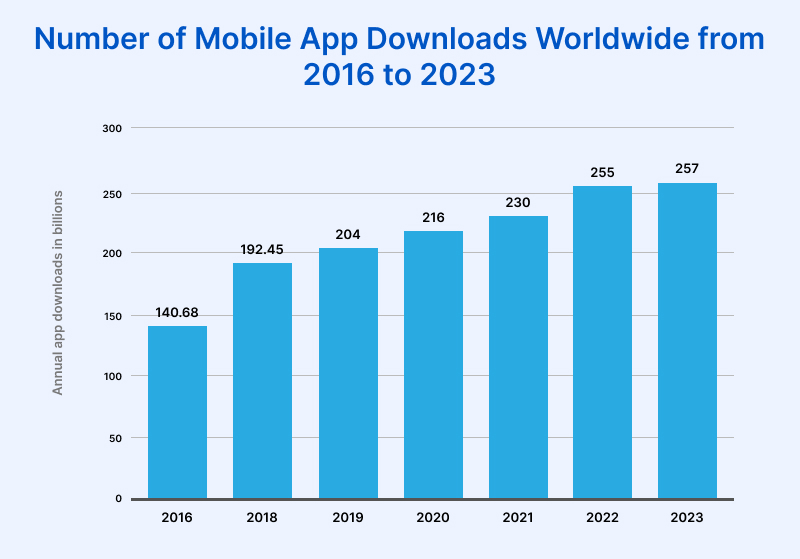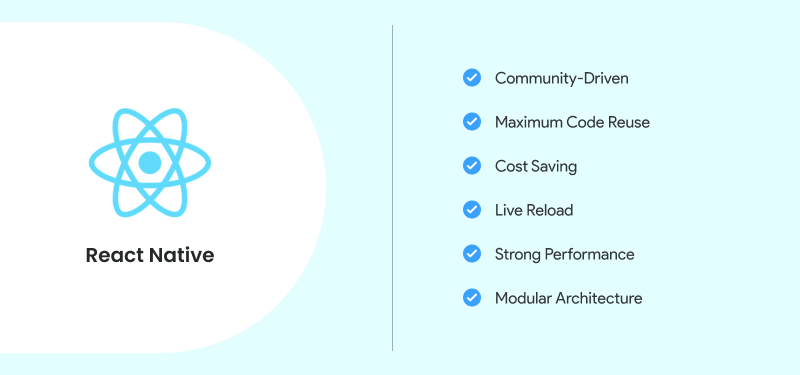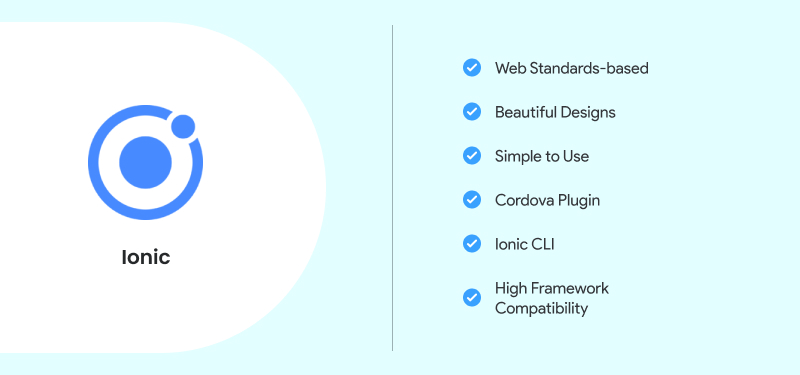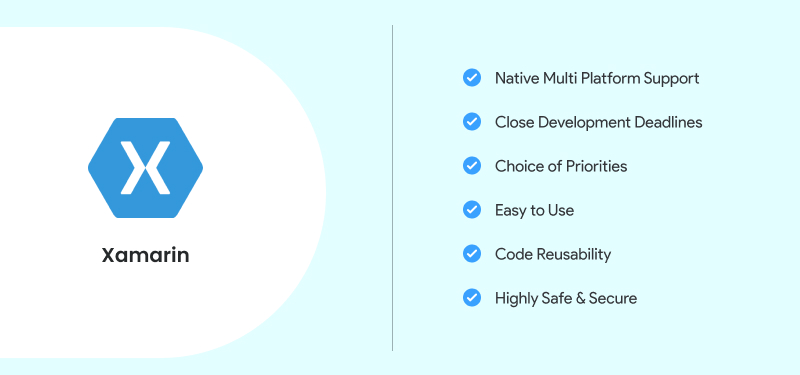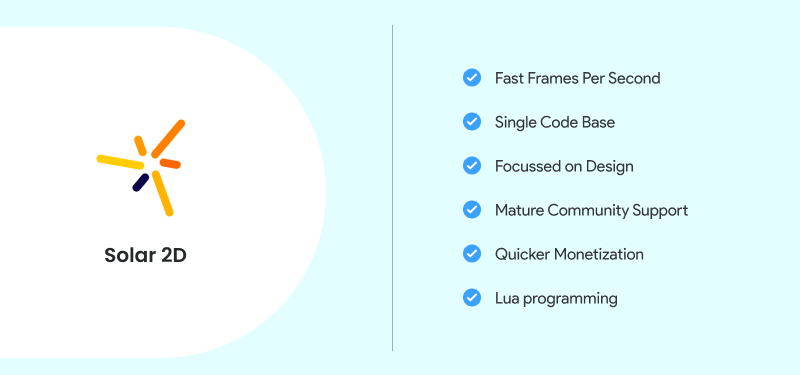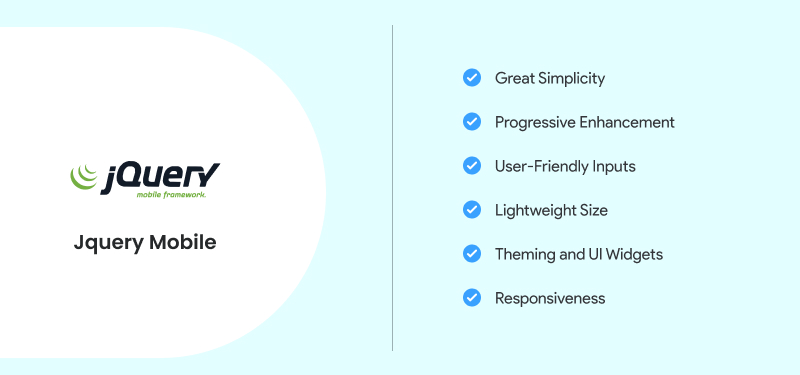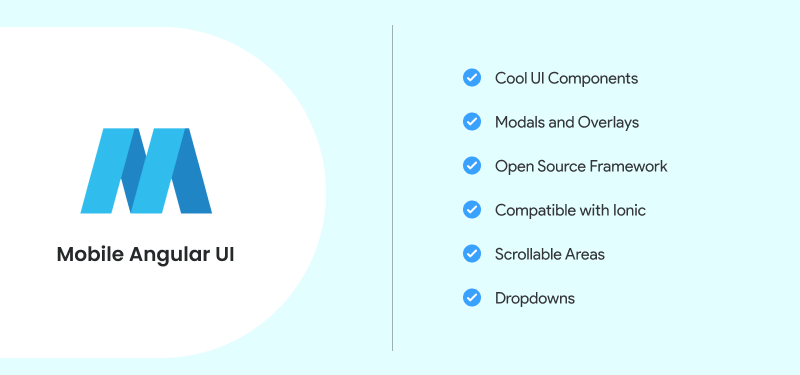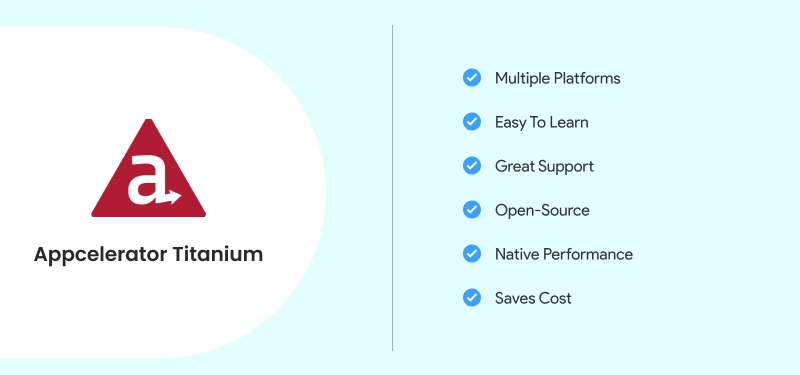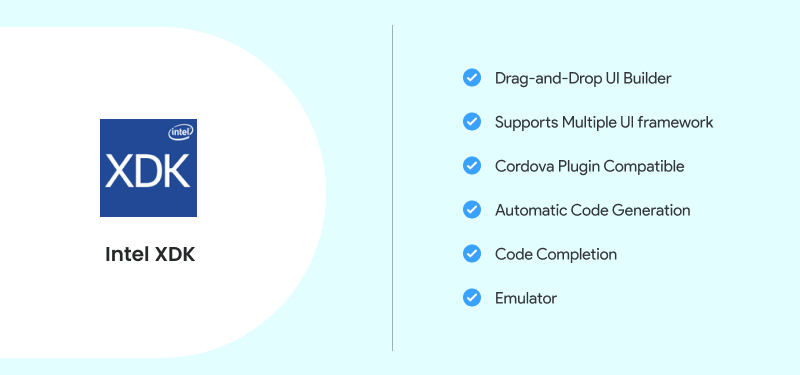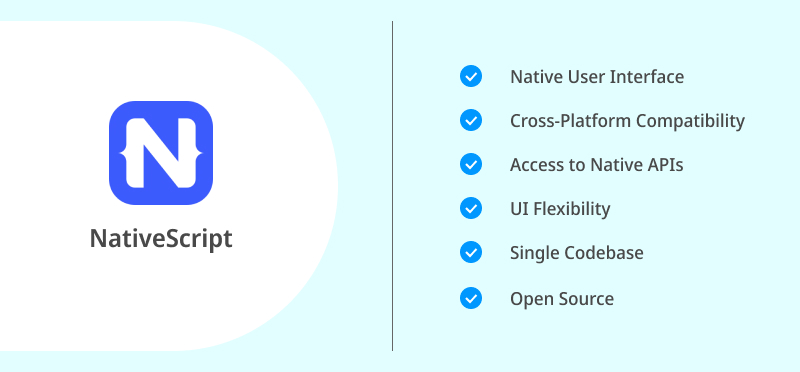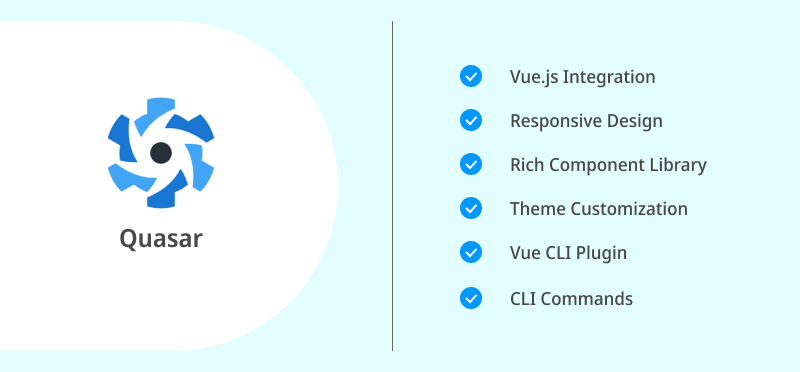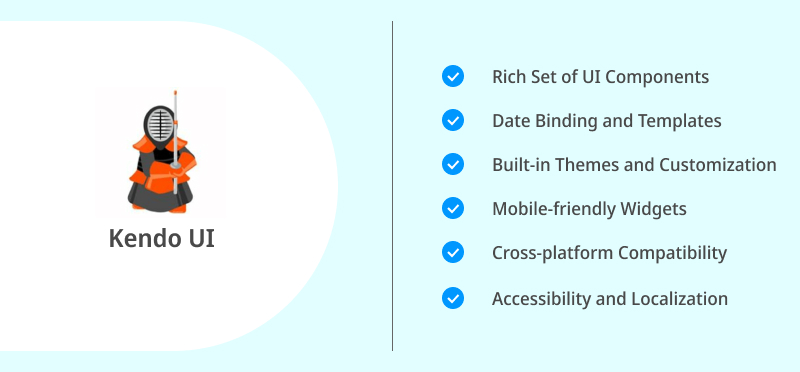Hybrid mobile app development frameworks simplify the process of building your first mobile app. They help you create apps that work on different platforms without requiring you to learn native coding languages. This way, you can focus on providing a great user experience and usability for your product.
Statista states, “Mobile apps are projected to generate over 613 billion US dollars in 2025. Creating a hybrid mobile app lets you reach multiple operating systems simultaneously, saving time and money.” You must choose a compatible framework to maximize your hybrid mobile app development framework.
But which framework should you choose? There are many hybrid app frameworks today, and it can be challenging to pick the best one if you don’t know what you’re looking for.
In this blog, we will help you find & choose the best framework based on your needs and goals to succeed in the mobile marketplace!
Here’s what you need to know about hybrid app frameworks before deciding.
This article will highlight some of the top hybrid mobile app frameworks for 2024.
Table of Contents
What is Hybrid App Frameworks?
A hybrid app is a software and mobile app development framework that helps developers use web technologies like HTML, CSS, and JavaScript to create hybrid mobile applications.
These frameworks provide tools, libraries, and pre-built components to streamline the development process and enable developers to create mobile apps that can run on multiple platforms using a single codebase, including iOS, Android, and sometimes even desktop platforms.
Typically, hybrid app frameworks use web views inside a native container to create the user interface and provide access to hardware components like the accelerometer, GPS, and camera. Frameworks for well-liked hybrid apps include PhoneGap/Cordova, Xamarin, React Native, and Ionic.
Contact us to kickstart your business journey with our tailored services.
Top Technologies to Build Hybrid App in 2024
Technologies for hybrid app development are expected to revolutionize mobile application development framework by 2024. Developers have many possibilities due to increased cross-platform demands and technological improvements. Here are the top technologies for creating hybrid apps are as follows:
- Flutter
- React Native
- Ionic
- Xamarin
- Solar 2D
- Jquery Mobile
- Mobile Angular UI
- Appcelerator Titanium
- Intel XDK
- NativeScript
- Quasar
- Kendo UI
1) Flutter – Ability to Go Beyond Mobile
Created by Google in 2017, Flutter is a cross-platform app development framework that allows developers to build an application for both iOS and Android devices. This app framework has been trendy since its launch because of Google’s involvement and its versatility.
Many users say they enjoy working with Flutter because it is easy to learn and quickly gets ideas into apps. Overall, Flutter receives high ratings from most of those who try it.
Pros of using Flutter:
- Flutter is free and open source. And, since it’s open-source, you can use it freely to build your projects or sell your work.
- Flutter is a new mobile app SDK for building high-performance, high-fidelity apps for iOS and Android from a single codebase.
- Thanks to its rich Material Design Widgets library, Flutter makes building beautiful mobile apps simple and easy.
- A blazing-fast 60fps on Android devices with Google’s Closure compiler.
- Dart, is one language for both Android & iOS development with an improved type system.
- Highly customizable platform themes.
- Code reusability due to shared UI components across platforms.
Top Apps using Flutter:
- Google Ads- Ad Campaigns Management App
- Hamilton- Music-based App
- Pairing- Dating-based App
2) React Native – Backed by Facebook
React Native is counted among the robust cross-platform app development frameworks. It offers a more native look and feels and first-class support for things like TouchID and push notifications, and React Native is appealing.
Pros of using React Native:
- React Native, a Facebook technology for building mobile apps with Javascript, has become one of the most popular app development frameworks.
- 95% of the code is cross-platform compatible.
- React Native leverages GPU and provides excellent app performance.
- Higher flexibility helps in creating smooth updates in no time.
- React Native has a hot reload feature that speeds up the development process, thus saving development costs and time.
Top Apps using React Native:
- Facebook- Social Media App
- Instagram- Social Connectivity App
- Skype- Video Calling-based App
Also Read – Why is Hybrid Approach a Good Choice for Mobile App Development?
3) Ionic – Powerful Tool Set of Plugins and APIs
While it’s probably not entirely fair to call Ionic a framework, it is more of a hybrid mobile app development tool and has become one of the most popular in recent years. That’s primarily because of its affiliation with AngularJS. Ionic and Angular can help you build cross-platform mobile apps quickly, even without significant programming experience or knowledge.
In addition to being one of Android’s top tools for creating hybrid apps, Ionic also has an impressive user base: It claims that there are more than 30 million downloads per month and growing.
Pros of using Ionic:
- Ionic is a responsive, mobile-first front-end framework for developing hybrid mobile apps with HTML5.
- Built and maintained by developers at ionic technologies.
- Ionic supports AngularJS and allows you to build native applications using Cordova plugins.
- It uses Web Components & web standards to deliver cross-platform experiences for mobiles & other devices.
- It comes with high-quality UI components and gestures, along with easy-to-follow development tools and services that make it easy to develop hybrid apps in no time.
Top apps using Ionic:
- Sworkit- Fitness App
- Justwatch- Streaming Engine
- McDonald’s Turkiye- Food Delivery app
4) Xamarin – Cost-Effective Framework
With Xamarin, software developers can use a single programming language (C#) to create Android, iOS, and Windows mobile apps. The framework creates native mobile apps using up-to-date tools and an efficient coding workflow.
You can think of Xamarin as a type of precompiled C#. There are some apparent pros here for developers who don’t have experience with cross-platform development or multiple programming languages. Leveraging all your existing skills is excellent, but there’s also a potential risk here.
Pros of using Xamarin:
- Xamarin will help you create incredible apps that run on all platforms, including iOS, Android, Windows, MacOSX, and others.
- Xamarin will allow you to reuse your code and make it more cost-effective for your business.
- Many developers choose Xamarin because it allows you to easily extend existing C# code with native APIs to build cross-platform applications.
- Not only developers but also businesses are moving towards using Xamarin to reduce their costs for mobile app development.
- One significant advantage of developing mobile apps using Xamarin is that it will allow easy access to user analytics and crash reporting features, which are essential for any business looking to succeed in today’s competitive market.
Top apps using Xamarin:
- Storyo- Video Story Creator
- Just Giving- Online Fundraising Platform
- The World Bank- Survey Conducting App
Read Also: Hybrid App Vs. Native App: Which is The Best For Your Business in 2024?
5) Solar 2D – Earlier Known as Corona SDK
Solar 2D is counted among renowned hybrid app development frameworks that work with native iOS and Android app development languages. The strength of Solar 2D lies in its use of simple, standard Lua code to create native applications while still providing all of the features you’d expect from a hybrid mobile application.
Today, Solar 2D has more than 220 published apps in its catalog, including titles like Invincible Armada and Inklingo Photo Lab. Plus, it’s free to download and distribute your App on iTunes or Google Play using Solar 2D technology.
Pros of using Corona SDK for your Hybrid app development
- The new Corona SDK helps reduce bugs and builds a beautiful cross-platform app for iOS and Android with less effort.
- Using Corona SDK is easy because it uses a Lua programming language that is easy to learn and understand.
- The best thing about using Corona SDK is that you can build apps for any platform without having to use additional code or other languages,
- It saves you from extra development costs.
Top Apps using Corona SDK:
- Tiny Boxes- Puzzle-based gaming app
- I Love Hue- Color-based gaming app
- Scale- Arcade Game app
6) Jquery Mobile – Uncomplicated and Flexible
JQuery Mobile has a steep learning curve for beginners, but if you understand how JQuery works, it is an easy framework to grasp. JQuery Mobile is used for cross-platform compatibility and is optimized for touchscreens. The resulting website or application looks and feels like a native app.
JQuery Mobile also features media queries that make it easier to adapt mobile apps to various screen sizes and resolutions. One downside of using Jquery mobile is that when users visit your site from a desktop computer, they are directed to an error page because, by default, most websites redirect their desktop traffic to a mobile version of their site.
Pros of using Jquery Mobile:
- Support for all major mobile platforms and frameworks. The Jquery library supports almost every significant framework, including Cordova/Phonegap, Xamarin, Titanium, and Wix App builder.
- Jquery is currently running on 90% of devices, so you can be sure that your App will run smoothly across all different platforms.
- Jquery comes with excellent documentation, making it easy to develop your new hybrid App!
- Massive community support. Jquery mobile has enormous community support, which is a pro considering that most enterprise organizations have not adopted hybrid app development yet.
Top Apps using Jquery Mobile:
- Backbone- Demo App
- Contact-based application- Demo App
7) Mobile Angular UI – Creates Attractive HTML5-based Apps
Angular is a JavaScript framework for creating interactive web applications. A few frameworks based on Angular are Ionic Framework, Onsen UI, Miui mobile, and more. Angular apps allow users to access their content quickly with fast download speed and efficient information processing.
In short, Angular is a framework for developing hybrid mobile apps or responsive web applications using HTML5 & CSS3 that run on mobile devices with a browser or as standalone native apps using Apache Cordova.
The application development process involves writing HTML/CSS/JavaScript code that describes your desired application structure instead of how it looks.
Pros of using Mobile Angular UI:
- It is easy to use. Its wide array of UI elements and components has many customizable features for high-quality output.
- It allows you to create multi-channel applications compatible with devices such as desktops, tablets, and mobile phones.
- It has an Angular JS framework for building high-end single-page apps. With integrated directives like NgRepeat, NgModel, etc.
- It supports the development of reusable templates while reducing code duplication within your App.
- You will not need to depend on multiple technology stacks when creating hybrid mobile apps. It takes care of everything from front to back-end development, making things easier and smoother for developers.
Top Apps using Mobile Angular UI:
- Forbes- Magazine-based App
- PayPal- Payments-based App
- Gmail- Email-based App
8) Appcelerator Titanium – Speeds-Up Development
With over 20 million downloads since its first release in 2007, Titanium is one of the most widely used hybrid mobile app frameworks.
A cross-platform mobile app development framework, Titanium takes JavaScript source code and converts it into a native application using WebKit. The web-based framework is famous for developing apps for iOS, Android, BlackBerry, Windows Phone, Facebook apps, and HTML5 apps.
Pros of using Appcelerator Titanium
- There is a high performance on mobile applications.
- There are many cross-platform frameworks available, but Titanium always gives you a guarantee of success.
- The SDK for Appcelerator is open source, so you don’t have to spend thousands of dollars in license fees.
- You will not face any issues getting into a native coding environment because Titanium works efficiently on browser environments and device-specific windowing systems like iOS or Android/Windows.
Top Apps using Appcelerator Titanium:
- InMobi- Money-Making Ad-based App
- PayPal- Payments-based App
- Paint- Drawing-based App
Also Read: Top Web Development Frameworks for 2024 Comparison.
9) Intel XDK – Clean and Easy-to-Use Interface
XDK is an HTML5 hybrid app development framework that lets you use web technologies to develop cross-platform apps for Android, iOS, and Windows Phones. Cross-platform capabilities combined with a simple codebase make XDK one of our favorites.
You can even create your custom version based on it. The downside? The interface isn’t as advanced as other frameworks, and there aren’t many documentation options. Still, if you want to test out mobile app development, XDK is a good option.
Pros of using Intel XDK:
- If you’re a web developer with solid knowledge of HTML5, CSS3, and JavaScript, Intel XDK offers you a brilliant, integrated platform for building mobile apps using open-source tools and technologies.
- You can use a set of Web UI widgets such as Material Design and Bootstrap 3, along with AngularJS, HTML5 canvas, and WebGL technologies.
- Intel XDK allows developers to quickly build cross-platform hybrid apps deployed on Android devices through Google Play or tested in an iOS app store.
- According to various reviews from industry leaders in app development, Intel XDK is easy to use and has unmatched user experience design capabilities that help create beautiful hybrid applications for all types of users.
Top Apps using Intel XDK:
- Ninja Legacy- WP-based App
- Second Fiction- Game-based App
Grow your business with Hybrid App Development Frameworks. Let’s discuss how we can transform your business growth strategy.
10) NativeScript
NativeScript apps, first developed by Progress, can be constructed with JavaScript or any other language that translates to JavaScript, such as TypeScript.
With full-stack features, including router support, code generation, and integration with the Angular CLI, this hybrid mobile app framework offers extensive interoperability with current Angular versions. It has Vue integration through a community-developed plugin, allowing you to use Vuex, the CLI for Vue, and other great Vue.js features.
Pros of using NativeScript:
- Writing code only once and running it on numerous platforms, such as iOS and Android, can save time and work.
- Use native device features and platform-specific APIs straight from TypeScript or JavaScript.
- With the many UI components and plugins that NativeScript offers, you can make aesthetically pleasing and feature-rich programs.
- Popular JavaScript frameworks like Angular and Vue.js are smoothly integrated with NativeScript, giving developers freedom and familiarity.
Top Apps using NativeScript:
- FidMe – Digital wallet and loyalty card app
- Skorch – Social networking app
11) Quasar
With the help of the Vue.js-powered Quasar Framework, developers can create code once and have it simultaneously deployed as a desktop application (using Electron), mobile application (iOS, Android), and website (SPA, PWA, SSR), all from the same code base.
Quasar offers a cutting-edge user interface that is right out of the box and adheres to Google Material standards. This framework for hybrid mobile apps is really billed as “the most performance-focused framework” by its developers.
Developers also gain from other features like hot-reloading with the Quasar CLI. The framework’s extensive documentation and vibrant community are two of its most well-liked features.
Pros of using Quasar:
- Quasar is based on Vue.js and integrates seamlessly with its ecosystem and components.
- Writing code only once and having it run on multiple platforms, such as desktop, mobile, and online, can save time and effort.
- Quasar offers a range of platforms for customizable deployment options, such as PWA, SPA, SSR, Cordova, Electron, and Capacitor.
Top Apps using Quasar:
- QuickMocker- API mocking tool
- Metamask- Cryptocurrency wallet
12) Kendo UI
Kendo UI offers a vast library of JavaScript UI components and jQuery, Angular, React, and Vue libraries to develop hybrid mobile apps. Powered By Progress Telerik, the parent company of NativeScript. It includes dozens of ready-to-use jQuery, Angular, React, and Vue widgets.
The goal of Kendo UI is to facilitate the creation of fast, high-performing hybrid mobile apps by development teams. One of its main selling features is Kendo UI, which offers world-class support and guarantees that each component has undergone rigorous quality assurance testing.
Pros of using Kendo UI:
- Kendo UI saves time and effort when creating complicated user interfaces by providing many customizable UI components, such as forms, grids, charts, and calendars.
- Multiple platforms—web, desktop, and mobile—are supported by Kendo UI, easily facilitating development and deployment across various hardware and operating systems.
- Popular JavaScript frameworks like Angular, React, and Vue.js seamlessly interact with Kendo UI, giving developers freedom and familiarity in their development environment.
- Developers can construct robust and user-friendly apps with Kendo UI’s extensive feature set, which includes data binding, validation, localization, and accessibility right out of the box.
Top Apps using Kendo UI:
- Telerik Analytics- Web-based analytics platform
- Kinvey- App development platform
Get our expert guidance to discover the right hybrid app development framework.
Top 5 Reasons for Choosing Hybrid Mobile App Development
For the last couple of years, we’ve seen a rise in demand for hybrid app development among startups and established businesses. Many of you have been asking us why, and we’re excited to give you an answer finally! For your convenience, we’ve put together this list of the top 5 reasons to choose hybrid mobile app development, so you can see precisely what makes it such an attractive option.
1) Scalability
With hybrid apps, you can make your app available on Android and iOS without any significant hiccups. Since these are web-based apps, they’re compatible with nearly every modern mobile platform. It allows you to easily scale and deliver an exceptional user experience across multiple devices and platforms.
Additionally, since it uses native code to build native features, everything will be highly optimized for performance. Most users expect apps to load almost instantly—the instant loading offered by HTML5 ensures optimal speed for your customers regardless of their device or OS version.
You won’t have any issues supporting customers who don’t use state-of-the-art equipment; they will still have a great experience using your application regardless of their OS version or hardware capabilities.
2) Design Flexibility
Hybrid apps are designed using web technologies, which makes them highly flexible. Whether you’re building an app for Android or iOS, your developers will use open-source libraries that are compatible with both platforms.
As your business grows and your needs change, so can your mobile app. Simply update your web app, compile it for a new platform—and voila! You have a brand new feature or version of your application.
3) Faster Time to Market
The goal of your mobile app is to get it into your customer’s hands as quickly as possible, right? A hybrid approach allows you to do just that. Using web technologies like HTML5 and CSS3 will enable you to move fast and get your prototype in front of customers quicker than an all-native team.
Then when you’re ready for launch, simply switch out the web views with native components. Voilà! Your app has gone from prototype to final product without missing a beat. It’s fast—real fast! And if you’re growing at exponential rates, waiting months (or even years) to test out your idea isn’t a viable option.
4) Cost Saving
Hybrid mobile app development saves you time and money by limiting your changes later in development. No matter how solid a design or prototype is, it’s always cheaper and easier to get things right from day one of development—and hybrid mobile app platforms can do just that.
Some platforms have been shown to slash up to 70% off of standard development costs. Give yourself a fighting opportunity for success by choosing a venue with cost-saving features baked in from day one.
5) Differentiate From Competition
According to a recent Forbes study, over 75% of new mobile apps fail. On top of that, app development can be time-consuming and expensive – with a cost per app ranging from $1 million to more than $5 million.
One alternative is hybrid mobile app development – a process in which a cross-platform framework allows developers to create an app with native functionality using HTML5, CSS3, and JavaScript.
Partner with us to choose the best framework with our expert assistance.
Wrapping Up
That was all about the top frameworks to go for hybrid app development. The most compatible framework largely depends upon the kind of project and its core requirements.
Connect with a hybrid mobile application development company in India for a free consultation and affordable development of your project.

